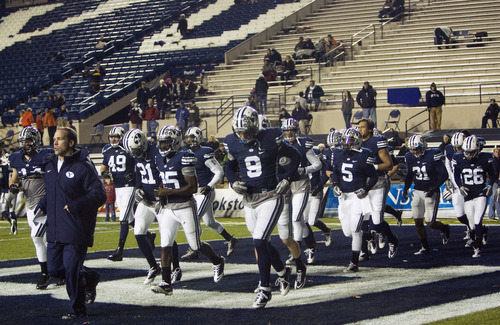This is an archived article that was published on sltrib.com in 2011, and information in the article may be outdated. It is provided only for personal research purposes and may not be reprinted.
What is BYU's value to a conference if the Cougars insist on retaining all TV rights to their home football games?
Zero.
At least in terms of television, which is where leagues make huge amounts of money.
Adding BYU to the Big East could, perhaps, help that league maintain its AQ status. But TV revenue is 10 times as important as BCS revenue.
Literally.
This year, BCS bowl games will generate $125 million. During the 2012 season, it's estimated the ACC, Big East, Big Ten, Big 12, Pac-12 and SEC will rake in at least $1.2 billion from TV.
When leagues sell TV rights, their inventory is conference games. In some cases, it's all home games.
A league member that doesn't add to that inventory is worthless. And, while BYU athletic director Tom Holmoe tried to clarify the situation on KSL radio on Monday night, he acknowledged making a proposal to the Big East that "We could sign on right now, if there were TV rights for our home games."
Was that unreasonable?
Yes.
It doesn't matter that, as Holmoe maintained, BYU was making a counterproposal in order to keep the talks alive. That position alone would kill talks with any league.
It was as if BYU was negotiating a marriage prenup and asking to keep all the money it brought into the union and all the money it made during the marriage. Not the basis for a strong union.
Certainly, there are a lot of reasons not to join the Big East. There's the geography. The uncertainty about a TV contract. The questions about the league retaining its AQ status. The possibility that the BCS will drop AQ status for all leagues and just match No. 1 vs. No. 2.
And the Big East is hardly stable. Even as it seeks to expand, rumors swirl that four of five remaining football members are looking for a way out.
But if you're going to ask to retain home TV rights, there's no point in negotiating with any league. No league is going to agree to that. Not for Texas, not for Notre Dame, not for BYU.
It's not hard to understand why the Big East would feel it wasted weeks negotiating with BYU.
It's not hard to believe that someone inside the league would tell Brett McMurphy, of cbssports.com, that BYU became "extremely unreasonable all of a sudden" and call the school's lawyers "a piece of work."
Certainly, that's spin from the Big East. But, spin or not, it reflects badly on BYU. And, given the school's rather acrimonious departure from the Mountain West and failure to reach a deal with the Big 12 or the Big East, an "unreasonable" shadow has been cast on BYU.
Pursuing membership in a conference is BYU's decision to make. Clearly, the school's leadership believes that its current deal with ESPN is better than joining a league.
That's debatable. Exposure is great, but it doesn't equal relevance.
And, while 10 of 12 Cougar games were on an ESPN network this season, that's not going to happen every year. The contract calls for a minimum of three home games on ESPN, ESPN2 or ABC and a minimum of one home game on ESPNU.
BYUtv can air home games, but there's no guarantee on road games. So there could be untelevised football games in the Cougars' future.
But if maintaining the current TV contract is of ultimate importance, don't waste the Big East's time. Don't burn bridges.
Because it was an unreasonable request.
Scott D. Pierce covers television for The Salt Lake Tribune. His Sports on TV column runs Mondays and Wednesdays. Contact him at spierce@sltrib.com, follow him on Twitter @ScottDPierce; read his blog at sltrib.com/blogs/tv.



